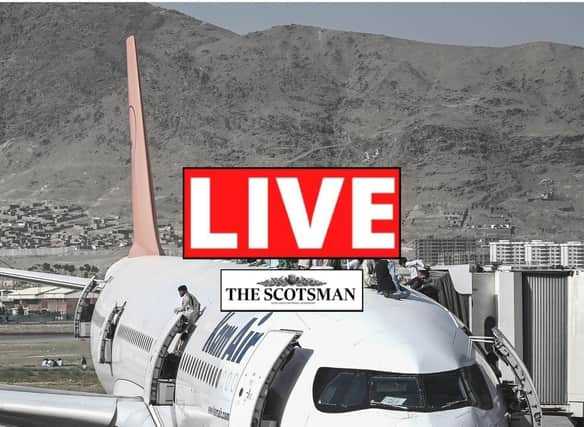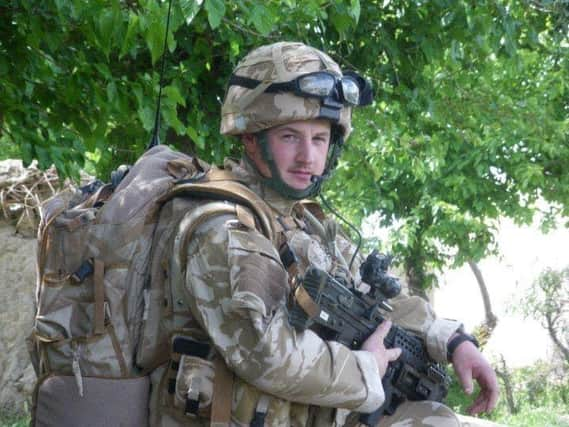Afghanistan crisis RECAP What is happening in Afghanistan today | Joe Biden speech reaction | Dominic Raab defends UK Government


Follow along here.
Afghanistan crisis RECAP: Latest news and updates
Key Events
- ‘Women’s rights very important under our rule', claims Taliban
- Britain did not see Taliban takeover coming, Foreign Secretary says
- PM to unveil plan to let vulnerable Afghans set up home in UK
- Prince Harry encourages veterans to ‘support one another’ amid Taliban takeover


'Everything we’ve done has been for nothing' - Scots veterans reflect on Afghanistan chaos
Scottish veterans who served in Afghanistan and the families of their fallen comrades have questioned the legacy of Britain’s two decade-long engagement in the country, with one grieving mother fearing their sacrifice has been “for nothing”.


Dominic Raab insists Britain did not see Taliban takeover of Afghanistan wcoming
Dominic Raab has claimed Britain did not see the Taliban takeover of Afghanistan coming.
Stormont Executive urged to provide homes for Afghans who helped allied forces
The Northern Ireland Executive has been urged to provide a safe home for Afghans who helped allied forces.
The call came from Ulster Unionist leader and Army veteran Doug Beattie, who won the Military Cross for his service in Afghanistan.
As scores of people attempt to flee the country following the taking of capital Kabul by the Taliban, Mr Beattie said Northern Ireland should offer a home to those who need it.
“Today a humanitarian crisis is unfolding in Afghanistan, thousands are fleeing the country: women, young girls and men, those who worked with us and those who worked for us,” he said.
“It’s important now that Northern Ireland, along with the rest of the international community, come together to support these people, and if they need a home then it is important that we here in Northern Ireland open our doors and give them a home.
“In our time of need they supported us, in their time of need, we must support them.”
MPs are to debate the situation in Afghanistan on Wednesday in the House of Commons.
DUP leader Sir Jeffrey Donaldson earlier said Northern Ireland has a duty to consider offering sanctuary to some refugees from Afghanistan.
He told the BBC he feared there would be “terrible consequences from the Taliban” for people who “very courageously worked alongside our military”.
Raab ‘wouldn’t have gone on holiday’ had he predicted Afghanistan situation
Dominic Raab conceded he would not have left the UK had he known what would unfold in Afghanistan over the weekend, following reports he remained on holiday until late on Sunday.
The Foreign Secretary was seen relaxing on a beach on the Greek island of Crete on Sunday, the same day members of the militant group Taliban entered Kabul, according to a report in The Telegraph.
The newspaper reported that Mr Raab then caught a flight back to the UK on Sunday evening. It said the Foreign Office did not deny that Mr Raab spent time on the beach, but that it dismissed suggestions he had been there for a considerable amount of time.
Speaking on Sky News on Tuesday morning, Mr Raab said that “no-one” saw the situation in Afghanistan coming.
And when asked how sorry he was that he did not return from his holiday earlier, the Foreign Secretary told Sky News that he returned “as soon as the situation deteriorated and demanded it”.
He said: “Everyone was caught off-guard by the pace, scale of the Taliban takeover.”
British holidaymaker, 21, evacuated from Afghanistan after hiding from Taliban
A British student who travelled to Afghanistan on holiday has been evacuated to Dubai after being forced in to hiding by the advance of the Taliban.
Loughborough University student Miles Routledge, 21, received widespread attention and criticism on social media having travelled to the country on a planned trip last week despite the extremist group’s gains in the nation.
Mr Routledge had shared updates about his experiences over recent days as the Taliban seized the country, including claims he had encountered the group’s members, seen dead bodies in the street and shielded from gunfire in a Nato-controlled safe house.
On Tuesday he then told followers that he had got a place on a list for evacuation from Kabul, and hours later posted a video of himself and dozens of others landing in what he described as a British Army plane.
“The happy ending: landed in Dubai thanks to the brilliant people at the British army. All safe!” he wrote.
Author Khaled Hosseini tells BBC he fears for progress made by Afghan women
The gains Afghan women have made over the past 20 years are “up in the air”, Afghan-American author Khaled Hosseini said.
He spoke of his fears as the Taliban quickly seized control of Afghanistan following the US exit after almost 20 years of a US-led coalition’s presence in the country.
Hosseini told BBC Radio 4’s Today programme that “while the last 20 years have certainly been challenging and beset by missteps and tragedies, it is also true that there has been progress in Afghanistan”.
The “significant improvements and achievements” have included women serving in the Afghan parliament, becoming police chiefs and being part of the workforce, and millions of girls who had returned to school.
He said: “Now all of that is up in the air and whether any of those gains will last remains to be seen.”
Royal Navy Vice Admiral Sir Ben Key said British armed forces “can’t afford to pause” as they work with US troops to help get about 6,000 people out of Afghanistan via Kabul.
Sir Ben told Sky News: “The demand placed upon us is in the order of 6,000, both Arap (Afghan Relocations and Assistance Policy) and entitled personnel.
“Those numbers are changing all the time as we understand the scale of the ask – people are coming forward making themselves known through the FCDO consular services or into us under the Arap programme.
“How long have we got to do it? We don’t really know, so every day we are working as hard as we can to bring as many forward into this pipeline as we possibly can.
“Clearly there is a dynamic political situation running across the city.
“We make no assumptions about that other than we really can’t afford to pause and wait.”
Asked how people who are eligible to come to the UK could get to Kabul airport with Afghanistan in Taliban control, Royal Navy Vice Admiral Sir Ben Key told Sky News: “Much of that journey is for them to undertake.
“It is quite obvious that the Taliban now are the prevalent security providers across Afghanistan – that’s a fact – so therefore it is much up to them and these individuals, as we call them forward, to make their own way to the vicinity of the airport.
“We then bring them into the airport and process them, bring them into the airport and bring them back into a place of repatriation.”
Sir Ben told BBC Radio 4’s World At One programme the Taliban seemed “acquiescent” about allowing people to reach the airport, saying: “It is a statement of fact that they are now controlling all of the access points around the airport, so at a tactical level, around the gates, we are having to have a pragmatic engagement with the local Taliban commanders.
“And thus far – and recognise, please, that we are only a day and a half into this kind of new situation – they have seemed acquiescent and understanding of what we are trying to achieve.
“We don’t take it for granted, and the local commanders continue to engage with them at the gate accesses to achieve what we want to achieve.”
UK wants to work with ‘challenging’ China and Russia on Afghanistan response
Boris Johnson hopes to convene a meeting of world leaders at the “earliest opportunity” as he looks to co-ordinate the international response to the Taliban’s takeover of Afghanistan.
The Prime Minister is pushing for a virtual G7 meeting to be arranged, raising the idea with German Chancellor Angela Merkel during a call on Tuesday and doing the same during talks with French President Emmanuel Macron on Monday.
And in a signal that Mr Johnson wants to draw together a broad coalition, Downing Street confirmed the UK wants the five permanent members of the United Nations Security Council (UNSC) – which, as well as Britain, includes the US, China, France and Russia – to meet this week.
The gathering would extend even further than the G7 alliance of Canada, France, Germany, Italy, Japan, the UK and US, with the Prime Minister keen for leading economies to act together on choosing how to broach relations with a Taliban-led state in Afghanistan.
A Downing Street spokeswoman said Mr Johnson and Mrs Merkel agreed that “global co-operation was crucial”.
Foreign Secretary Dominic Raab confirmed the UK would have to work with “challenging” partners on its approach to dealing with the Taliban following their capture of Kabul.
UK relations with Moscow have been strained in recent years, particularly since the Salisbury Novichok attack in 2018, while Beijing and London have been at loggerheads over China’s growing technological influence amid security and spying fears.
US and allies faced ‘serious dilemma’ when deciding to withdraw from Afghanistan, says Nato secretary general
The secretary general of Nato has said the US and its allies faced a “serious dilemma” when deciding whether to withdraw from Afghanistan.
Speaking at a press conference in Brussels, Jens Stoltenberg said: “Ending our military mission was not easy, we were faced with a serious dilemma – either leave and risk seeing the Taliban regain control, or stay and risk renewed attacks and an open-ended combat mission.
“We never intended to stay in Afghanistan forever.”
He added: “What we have seen in the last few weeks was a military (and) a political collapse at a speed which had not been anticipated.
“Parts of the Afghan security forces fought bravely but they were unable to secure the country because, ultimately, the Afghan political leadership failed to stand up to the Taliban and achieve the political solution that Afghans desperately wanted.”

